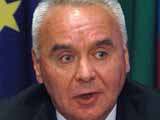|
|
TODAY.AZ / Business
Azerbaijani official: Global crisis facilitates process of WTO admission
31 March 2010 [15:28] - TODAY.AZ
The Azerbaijani government plans to send new proposals on goods and services to the World Trade Organization (WTO) Secretariat as part of its negations to join the WTO, Chief Negotiator and Deputy Foreign Minister Mahmud Mammadguliyev said.
 "This will allow the next meeting with WTO members to take place in the
first half of 2010," he said. "If we would have failed to send our
proposals to the WTO in April, then the talks would have been scheduled
for the second half of 2010."
"This will allow the next meeting with WTO members to take place in the
first half of 2010," he said. "If we would have failed to send our
proposals to the WTO in April, then the talks would have been scheduled
for the second half of 2010."The Azerbaijani government has prepared a proposal in the field of services to the United States, EU, Japan and South Korea in the framework of negotiations on accession to the WTO.
He said the global crisis has intensified the accession processes, as it provides more opportunities for trade. In this regard, Azerbaijan continues its preparatory work. The February meeting of an Azerbaijani governmental commission reviewed the bilateral and multilateral negotiations, and the need to improve tariffs on certain agricultural products and fish products.
The July meeting of the WTO working group committed members to present their questions to the secretariat by Sept. 14.
In addition to the United States and the EU, the country also received questions and comments from Australia, concerning the domestic support and export subsidies that Azerbaijan will use. The country also received questions from Brazil about tariffs, and form South Korea about tariffs and services.
Azerbaijan has been represented in WTO as a supervisor since 1997. The country is currently preparing for the eighth round of negotiations on accession to the WTO, and has already made proposals in the services field for the United States, EU, Japan and South Korea.
Azerbaijan seeks to join the WTO with the status of a developing country, which will allow the country to provide greater financial support to the agricultural sector. In this case, the country will be able to continue subsidizing at the level of 10 percent of GDP produce in agriculture.
At present, subsidies for Azerbaijan's agricultural sector are on average 14-15 percent. Given the agricultural field's need for support, Azerbaijan refuses to enter the WTO as a developed country. Thus, what the United States has insisted is to provide access to subsidies at the level of 5%.
He said restrictions imposed on subsidies affecting the regulation of agricultural product prices, and the scientific and technical work can be provided unfailing support.
In previous negotiations on international trade, several countries offered to reduce the tariffs below 15%, which today are the maximum rate of the customs duties in Azerbaijan. But in the proposals of the Azerbaijani government, the tariffs were set at 30%.
Tariff commitments are also key in the talks with the EU and the United States. In addition to the tariff policies, their claims were related to the liberalization of services. They suggest opening up markets in the financial and communications sectors, and in the sphere of services distribution.
Azerbaijan is in the process of holding negotiations with the United States, Japan, Brazil, Ecuador, Sri Lanka, European Union, Norway, India, South Korea and Taiwan. This year, Switzerland joined the list in 2009.
Currently, negotiations were completed and protocols were signed with Turkey, the Sultanate of Oman and the United Arab Emirates. The country is at the stage of signing protocols with Moldova, who is still considering the document. Kyrgyzystan and Georgia have agreed, and this procedure could take place at the next meeting of the intergovernmental commission.
Recently, the WTO Secretariat extended the working group on Azerbaijan by including four more countries, the Azerbaijani Economic Development Ministry reported.
The WTO Secretariat established the working group on Azerbaijan July, 16, 1997.
/Trend Capital/
URL: http://www.today.az/news/business/65101.html
 Print version
Print version
Views: 1707
Connect with us. Get latest news and updates.
See Also
- 27 October 2025 [19:22]
Azerbaijan, China discuss cooperation on green energy production - 27 October 2025 [19:00]
Audit confirms transparent and efficient financial management in COP29 Organization - 27 October 2025 [14:18]
bp introduces cutting-edge deepwater intervention technology to Caspian - 27 October 2025 [11:01]
ADB to support Baku Metro with $700,000 technical assistance for green transition - 26 October 2025 [20:30]
Weekly update on Azerbaijani oil prices - 26 October 2025 [19:03]
Media seminar held under EU4Energy project - 26 October 2025 [18:00]
Garabagh region welcomes over half million tourists this summer - 26 October 2025 [16:05]
Weekly review of Azerbaijan's precious metals market - 23 October 2025 [12:59]
Greco-Roman wrestler crowned world champion - 23 October 2025 [11:14]
Uzbekneftegaz and SOCAR discuss acceleration of geological exploration in Ustyurt Plateau
Most Popular
 Azerbaijan, Georgia strengthen partnership in field of security
Azerbaijan, Georgia strengthen partnership in field of security
 Art Weekend. Maksud Ibrahimbayov Creativity Centre to present multidisciplinary project 'Pistachio Tree: Roots of Memory' [VIDEO]
Art Weekend. Maksud Ibrahimbayov Creativity Centre to present multidisciplinary project 'Pistachio Tree: Roots of Memory' [VIDEO]
 Book on late photographer Samir Aliyev presented in Baku
Book on late photographer Samir Aliyev presented in Baku
 Baku hosts 'Study in Europe' Education Fair
Baku hosts 'Study in Europe' Education Fair
 FM Bayramov says that new agreement marks new era in Azerbaijan-UN Partnership
FM Bayramov says that new agreement marks new era in Azerbaijan-UN Partnership
 TURKPA's influence in Turkic World discussed in Ankara
TURKPA's influence in Turkic World discussed in Ankara
 Azerbaijani servicemen participate in Nusret-2025 Invitation Exercise
Azerbaijani servicemen participate in Nusret-2025 Invitation Exercise
